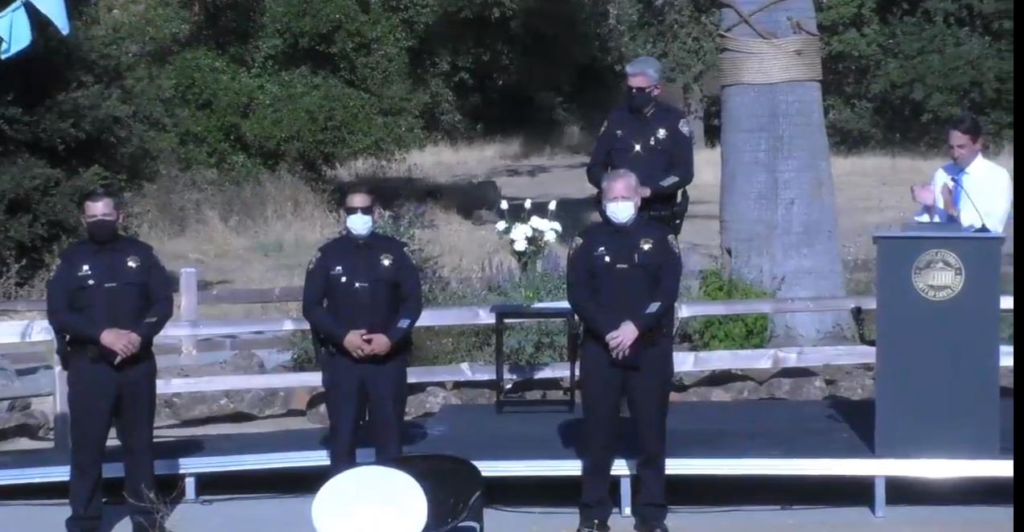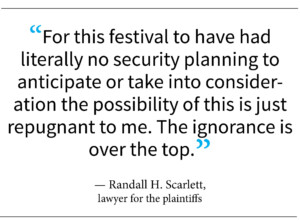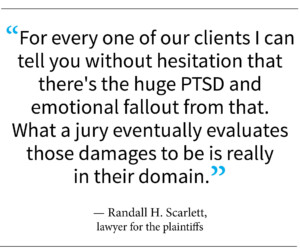Gilroy Garlic Festival mass shooting lawsuit heads to Superior Court
Case expected to last at least two months, seeking millions in damages
![]()

Photo courtesy YouTube
From left to right, Gilroy Police officers Robert Basuino, Hugo Delmoral, and Eric Cryar at a July 28, 2020, memorial honoring the victims and first responders from last year’s Garlic Festival shooting. The three received medals for their quick actions that saved lives.
By Marty Cheek
Victims and families of victims of the devastating 2019 Gilroy Garlic Festival mass shooting will soon see their case go to trial against the festival organizers for alleged negligence in security measures. They seek damages for physical and emotional trauma.
A trial setting conference meeting is scheduled with Superior Court Judge Peter H. Kirwan for 11 a.m. Jan. 17, setting the stage for a highly anticipated courtroom battle for potentially millions of dollars in damages.
 Scarlett Law Group filed a lawsuit in 2020 with the Superior Court of Santa Clara County on common law negligence grounds on behalf of 12 victims and survivors against the Gilroy Garlic Festival Association and First Alarm, its security company for the festival.
Scarlett Law Group filed a lawsuit in 2020 with the Superior Court of Santa Clara County on common law negligence grounds on behalf of 12 victims and survivors against the Gilroy Garlic Festival Association and First Alarm, its security company for the festival.
The city of Gilroy is also being sued on statutory grounds. The San Francisco-based law firm also filed a suit in 2021 against Century Arms, the Vermont-based company that manufactured the AK-47 style assault rifle used in the July 28, 2019 shooting.
In the festival’s final hour before closing that Sunday afternoon, the shooter, a 19-year-old Gilroy man, got through the unmonitored and unsupported fence on the northern end of Christmas Hill Park.
He fired rounds at people indiscriminately, killing guests Stephen Romero, age 6; Keyla Salazar, age 13; and Trevor Deon Irby, age 25. The gunman killed himself with his own weapon after a shootout with three responding Gilroy police officers.
According to the lawsuit document, GGFA failed to take sufficient action to protect its guests at the 42nd annual event.
Click HERE to view the lawsuit document.
These include: failure to foresee the distinct possibility of a mass shooting; conduct a threat assessment or security audit of the festival grounds; install appropriate sturdy perimeter fencing around the event that is properly monitored; place security guards and checkpoints around the event; and maintain clear lines of sight to the perimeter in vulnerable areas, such as where the shooter gained entry to the grounds.
“For this festival to have had literally no security planning to anticipate or to take into consideration the possibility of this is just repugnant to me. The ignorance is over the top,” said lawyer Randall H. Scarlett. “(Defense) witness after witness said, ‘Oh, there’s never been a shooting. We didn’t expect that. Why would we expect anything like this was foreseeable?’ It’s just ridiculous.”
 Because the case is in litigation, representatives for the association and the city of Gilroy said they will not comment on the lawsuit under the advice of their lawyers. First Alarm and Century Arms did not respond to requests for comment.
Because the case is in litigation, representatives for the association and the city of Gilroy said they will not comment on the lawsuit under the advice of their lawyers. First Alarm and Century Arms did not respond to requests for comment.
The plaintiffs in the suit are Wendy Towner, Francisco Aguilera, Nic McFarland, Justin Bates, Brynn Ota-Matthews, Gabriella Gaus, Harry De La Vega, Barbara V. Aquirre, Alberto Romero, Barbara J. Aquirre, Lesley Sanchez (a minor by her guardian, Diana Galindo) and Leslie Andres (a minor by her guardian, Laura Rodriguez).
The GGFA’s venue contract with the city of Gilroy — including the description of the festival and how it was managed — had not been changed since 1985, Scarlett said. It did not contemplate the modern-day realities of hosting a large-scale festival that could bring in between 80,000 to 100,000 for three days. The lawyer also believes the security protocols were “grossly outdated” and the defendants failed to adhere to federal guidelines for outdoor events, including the U.S. Department of Homeland Security Protective Measures Guide for U.S. Outdoor Venues Industry.
The aftermath after the shooter was dead was described by festival guests as chaotic and notably lacking medical and emergency personnel, Scarlett said. People had to treat one woman by washing her wounds with water mixed with bleach because no medical personnel came to her aid and there was an absence of adequate medical supplies.
The lawsuit seeks damages and injunctive relief from Century Arms, stating the company was “negligent and reckless” for manufacturing and selling the military-style assault rifle the gunman used.
 For this aspect of the lawsuit, Scarlett Law Group brought in Brady Legal Alliance, a network of hundreds of U.S. attorneys and law firms seeking to help drive gun violence reform and end gun violence. It is named after James Brady, Ronald Reagan’s press secretary who was permanently disabled during an assassination attempt in 1981 on the U.S. President.
For this aspect of the lawsuit, Scarlett Law Group brought in Brady Legal Alliance, a network of hundreds of U.S. attorneys and law firms seeking to help drive gun violence reform and end gun violence. It is named after James Brady, Ronald Reagan’s press secretary who was permanently disabled during an assassination attempt in 1981 on the U.S. President.
With the efforts of Brady Legal and Scarlett Law Group, the plaintiff’s legal team believes it is well-equipped to “prove that Century Arms’ conduct was reckless, was negligent, and was in violation of federal law and all standards of care,” said Jonathan Lowy, Brady chief counsel and vice president of Legal, on Scarlett Law Group’s website.
From his experience with other cases, Scarlett believes the jury trial will most likely run at least two months because of the complexities of the case. He would not provide an estimate of what the damages potentially awarded by a jury might be, but he said two of the victims have had medical expenses exceeding $2 million each. The psychological damage for the victims and their families has also been high, he said.
“For every one of our clients I can tell you without hesitation that there’s the huge PTSD and emotional fallout from that,” he said. “What a jury eventually evaluates those damages to be is really in their domain.”
 The 2019 shooting has had an impact on other South Valley annual festivals such as Morgan Hill’s Mushroom Mardi Gras and the Taste of Morgan Hill as the rising insurance rates and expenses of hiring extra security have made it almost prohibitive to put on these festivals and not lose money.
The 2019 shooting has had an impact on other South Valley annual festivals such as Morgan Hill’s Mushroom Mardi Gras and the Taste of Morgan Hill as the rising insurance rates and expenses of hiring extra security have made it almost prohibitive to put on these festivals and not lose money.
“We’re not out here trying to shut down festivals, and I certainly don’t want the brave plaintiffs in this case who stepped up to the plate to get blamed,” Scarlett said. “No one here is out to limit or prohibit or cause other festivals to shut down or not be able to take place. But there has to be some sort of give and take that occurs. You can’t put on events that aren’t safe. Who wants to go to an event where you can potentially come home in a body bag. There has to be some degree of control.”
